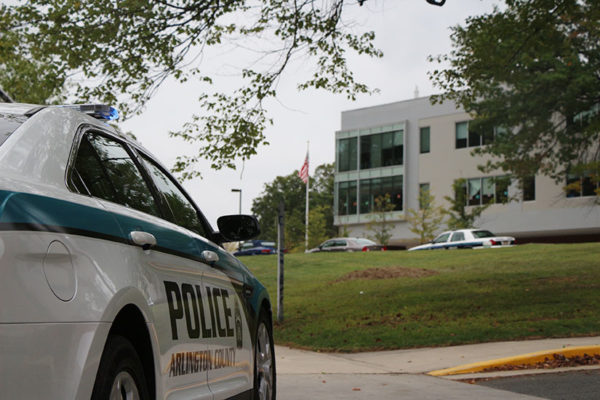(Updated 4:20 p.m.) Against the backdrop of Alexandria’s City Council voting to reinstate School Resource Officers, Arlington school and police officials say they’re confident kids and staff will be safe without daily police presence.
That’s because, leading up to the decision to remove SROs this summer, the county spent six years investing in other school safety pillars, adding counselors, enhancing building safety and beefing up emergency management operations, according to School Board Chair Barbara Kanninen.
When the School Board ended the program — out of concern for racial disparities in juvenile arrests — they did so knowing that staff could handle regular student disruptions without involving law enforcement, she said.
“I believe that background made us uniquely well-situated to think about the next step regarding SROs,” she said last night (Wednesday) during a discussion hosted by the Arlington Committee of 100 on school safety without SROs.
“It’s difficult talking about different jurisdictions in a harsh way, but the fact is that the Alexandria superintendent didn’t recommend removing SROs from schools for the simple fact that they didn’t believe they had the resources in place,” Kanninen continued. “They felt they needed SROs for safety.”
The discussion, which addressed current police engagement efforts and Arlington’s Restorative Justice program, couldn’t have been more timely. Not only did unsafe conditions in Alexandria schools lead the City Council to reinstate SROs this week, but also, APS recently had two safety-related incidents in which police got involved.

On Friday, allegations of sexual battery during Yorktown High School’s Homecoming football game resulted in a police investigation. Last Wednesday, police responded to false claims of a school shooter at Washington-Liberty High School.
As for Alexandria, Kanninen emphasized the fact that City Council narrowly voted to remove SROs against advice from the School Board, which voted 6-3 to keep them.
“We’re in a different situation,” Kanninen said. “We believe we have the resources and supports in place to keep kids safe as possible.”
In unsafe situations such as fights, she said APS has staff trained in defusing those situations and prefers this approach to introducing kids to the juvenile justice system.
“We don’t want their first interaction to be with a police officer,” she said.
Still, Kanninen said administrators will call 9-1-1 any time there’s a safety threat. For example, police were called to Washington-Liberty High School over the school shooter claim, conducted an investigation, found no threat and gave the “all clear” later that morning.
“Just like any other building, organization, or anyone in Arlington, if something happens, we’re going to call the police,” she said. “There have been situations where events happen in schools, and as a follow-up, parents may call the police. But for schools, we would do it if it’s a safety threat.”
Arlington County Police Department’s Deputy Chief of Community Engagement Wayne Vincent referenced a new state law that no longer requires school principals to call the police over certain possible misdemeanors. He said the law also lists which crimes require police intervention.
“For the most part, they’re pretty much all felonies, and some misdemeanor crimes,” he said. “While the schools are no longer required to call the police [for other instances], that doesn’t prevent students or parents from calling the police. We’ve seen that inside and outside the school.”
And if some unforeseen event precipitated a conversation about returning SROs?
“If we were asked to come back to schools right now, it’d be a minimum of 18 months before officers are back in the schools,” said Vincent, adding that the 16 SROs in place two years ago have all been reassigned or retired. Plus there’s a staffing crunch within the police department.
ACPD still engages with kids, Vincent said. A newly established, four-officer Youth Outreach Unit works with children through partnerships with affordable housing groups, sports teams, the Department of Parks and Recreation, and the Juvenile & Domestic Relations District Court.
Removing SROs “was challenging for us, but it provided an opportunity to really change our current philosophy from school-centric approach to community-based strategy,” he said.
Officers still teach students about substance abuse and driver’s education, conduct emergency preparedness work with APS, and participate in school-based threat assessment teams, which meet regularly to identify and preemptively address potential threats, he said.
“While we’re incredibly disappointed we’re not in the schools, I believe that we’ll be connected to youth because of the measures we’ve put in place to engage going forward,” Vincent said.
As for what the relationship between APS and ACPD will look like as time goes on, that will be hashed out in a new Memorandum of Understanding. Once the document is ready for review later this year, possibly Nov. 1, the community will have two weeks to provide feedback.


